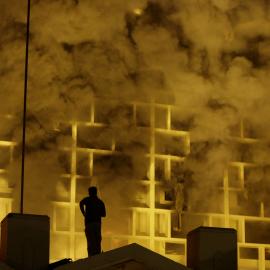To the Editor:
Bruce Riedel provides an interesting but uneven prognosis of Afghanistan's role in the next chapter of the war on terrorism ("Al Qaeda Strikes Back," May/June 2007). Reidel's recommendation that Washington enhance its commitment to the mission in Afghanistan is most welcome. Although the price of rebuilding Afghanistan will not be cheap, the cost of doing too little and failing to deliver on our promises will be exorbitant. New resources are needed to enhance the Afghan government's ability to provide protection and deliver services to its people.
Riedel correctly argues that a military approach alone will not defeat al Qaeda. In Afghanistan, as in the greater Middle East, comprehensive reconstruction combined with an enhanced campaign against the regional sources of terrorist training and indoctrination will undermine al Qaeda's ability to brainwash another generation of frustrated, impoverished young men. Riedel correctly locates al Qaeda's resurgent leadership in Afghanistan's restive backyard.
Building effective state institutions in Afghanistan is the most cost-effective means of combating al Qaeda and the Taliban. To this end, the Afghan National Army requires more trainers, better weapons, armored vehicles, and airlift capabilities to be a more effective and independent fighting force. Reidel's suggested diversion of troops from Iraq to Afghanistan would not necessarily empower the Afghan army. A relatively small deployment of special forces and infantry trained specifically for the unique combat situation in Afghanistan would be more effective than a large contingent of additional troops who arrived unaware of or unsympathetic to the sensitivities of Afghan society and culture.
Riedel's analysis underscores the lack of effectiveness in previous international assistance. Far too much aid is supply-driven and focused on wasteful technical assistance programs. When Afghans see poorly built schools and clinics collapsing in their provinces (or a lack of such facilities), they lose faith in the Afghan government and the international community. Too much aid is delivered outside the government's budgetary framework and guided by the priorities of donors rather than the national government. Currently, only five percent of international assistance funds are given to the Afghan government, and 83 percent are disbursed without the government's knowledge or approval. The consequence of this imbalance is a weak sense of ownership of the development process among Afghans themselves. In the absence of proper coordination and oversight, our sovereign government will be ill equipped to address local grievances; meanwhile, al Qaeda and the Taliban are capitalizing on the public's frustration. International donors must work together to increase the pace and scope of current capacity-building efforts, empower the private sector as the country's key engine of growth, and get aid into the hands of languishing villagers as quickly as possible. Despite their many frustrations, what the Afghan people fear most is that they will once again be abandoned by the international community.
Said T. Jawad
